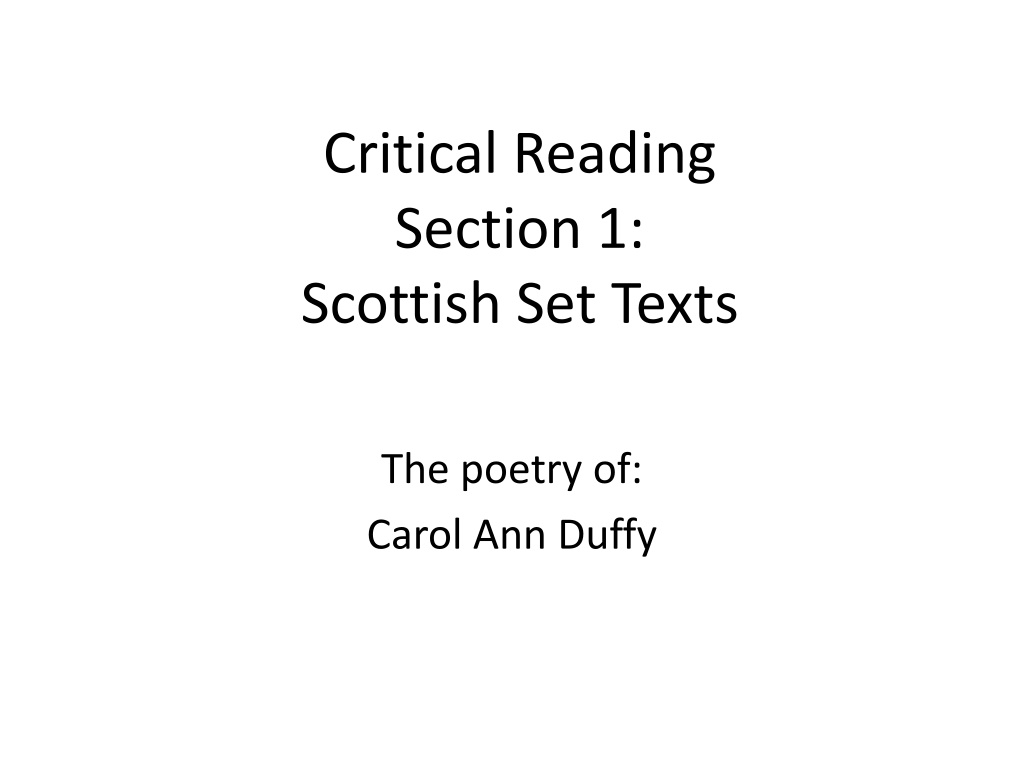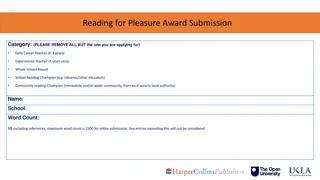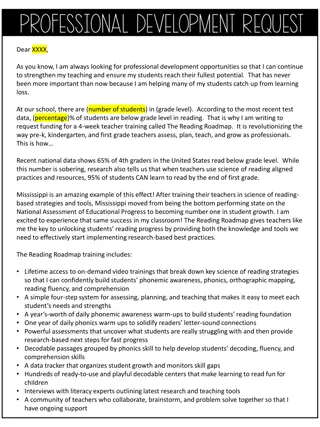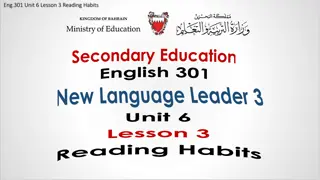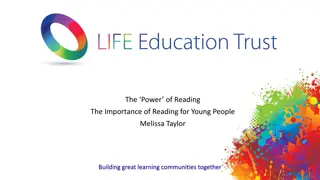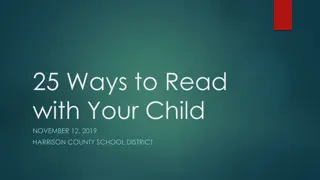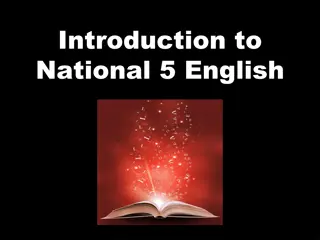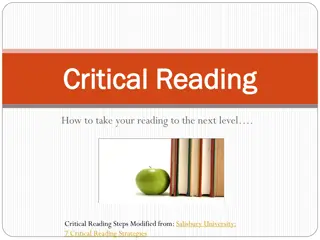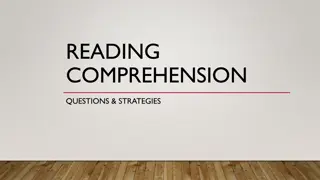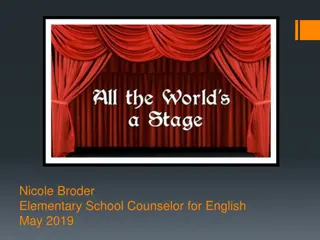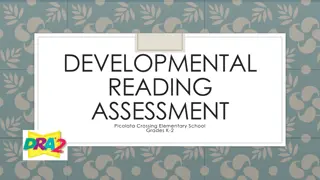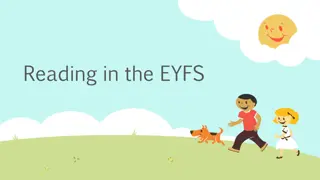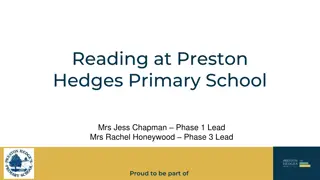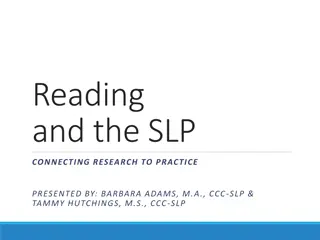Critical Reading
Explore Carol Ann Duffy's poems "Mrs Midas" and "Originally" from a Scottish perspective. "Mrs Midas" delves into greed, consequences, and isolation while "Originally" reflects on childhood memories and the impact of domestic changes on identity.
Download Presentation

Please find below an Image/Link to download the presentation.
The content on the website is provided AS IS for your information and personal use only. It may not be sold, licensed, or shared on other websites without obtaining consent from the author.If you encounter any issues during the download, it is possible that the publisher has removed the file from their server.
You are allowed to download the files provided on this website for personal or commercial use, subject to the condition that they are used lawfully. All files are the property of their respective owners.
The content on the website is provided AS IS for your information and personal use only. It may not be sold, licensed, or shared on other websites without obtaining consent from the author.
E N D
Presentation Transcript
Critical Reading Section 1: Scottish Set Texts The poetry of: Carol Ann Duffy
Mrs Midas Mrs Midas is a poem written from the viewpoint of the wife of the mythological King Midas, from Ovid s Metamorphoses. King Midas was granted a wish by the god Dionysus whereby everything he touched would turn to gold. With comical undertones, a wide range of emotions are expressed through the persona of Mrs Midas as she speaks out against her husband s foolish actions and gradually separates herself from him. She leaves him to waste away in isolation while she laments the loss of their physical relationship and the chance to have a baby together to fulfil their dreams.
Mrs Midas The main themes are: greed consequences isolation Greed is certainly a recurring theme as this is what motivated Midas to make his wish in the first place. The damaging effects are portrayed throughout with both husband and wife, in the end, being left alone to suffer the effects of wishing to possess a substance which ultimately feeds no one. Consequences are dealt with as we observe the impact of the gift on Midas and his wife. Duffy invites us to consider how something so precious like gold can easily become destructive. Isolation and loneliness in the end is all that is left for either character.
Originally In this autobiographical poem, Duffy considers and explores the sense of isolation and confusion she felt as a child when her family moved from the Gorbals in Glasgow to England. She describes both the literal details of the journey and the move as well as the deeper, metaphorical journey that she and her family experienced as a result of this decision. As the title suggests, she considers to what extent our identity is shaped and defined not only by our environment but by changes in dialect and culture. The initial catalyst for the poem, the memories of the move and her gradual assimilation into her new home, provokes a bigger, more philosophical meditation on the subject of childhood itself. Perhaps the most significant line in the poem comes at the start of stanza two when she asserts that All childhood is an emigration, revealing clearly the universal truth that the process of growing up is always synonymous with change.
Originally Themes In this poem, Duffy reveals the importance of early childhood memories and experiences in shaping identity and also considers the impact of significant domestic changes during the formative years. It is clear that even though Duffy was only six when she moved to England, her sense of Scottishness has stayed with her. However, this affinity has resulted in a sense of confusion about her own identity and where she belongs and the poem is her own attempt to define more precisely where her true origins lie. Although asserting that all childhoods involve change and transition, she feels a distinct pull towards this country that she left so young and there is a definite feeling of loss running through the poem. In recalling how easily her brothers were able to adapt she emphasises her own sense of separateness.
Valentine Valentine is from a collection of poems entitled Mean Time (1993), and expresses love and affection in the form of a conceit whereby the symbol of love being offered by the speaker is an unconventional onion. The poem challenges the stereotypical view of a Valentine s gift when the speaker presents their lover with the metaphorical onion as a moon wrapped in brown paper. This is reminiscent of metaphysical poets such as John Donne, who approached ordinary objects in original and surprising ways. The multi- layered complexity of the onion represents a real relationship and is used as an extended metaphor throughout. The strangeness of this unusual gift, which can make a lover cry, highlights the negative as well as the positive effects of a deep and loving relationship. The forceful presentation of this gift, and the final word choice, also suggests this is a relationship which is cruel, domineering and menacing.
Valentine Themes Like most of the poems in Duffy s Mean Time collection, Valentine deals with those involved in damaged or irreconcilable relationships. In Valentine, Duffy ends on a warning note that love can be Lethal and so life-threatening, forcing the reader to confront the notion that a real love based on honesty and truthfulness can be painful and destructive as well as fulfilling and enriching. The allusion to the negative aspects of conventional relationships suggests that, ultimately, they can often be restrictive to the individual, while a love which is free from such constraints is an ideal worth pursuing.
War Photographer Duffy was inspired to write this poem by her friendship with a war photographer. She was especially intrigued by the peculiar challenge faced by these people whose job requires them to record terrible, horrific events without being able to directly help their subjects. Duffy perhaps shares an affinity with these photo journalists - while they use the medium of photography to convey certain truths about the human condition, she uses words and language to do the same job. Duffy provokes us to consider our own response when confronted with the photographs that we regularly see in our newspaper supplements, and why so many of us have become desensitised to these images. By viewing this issue from the perspective of the photographer, she also reveals the difficulties of such an occupation. By the end of the poem, it is clear her subject straddles two vastly different worlds yet increasingly feels he belongs to neither.
War Photographer Themes The poem focuses on two main themes: the horror of war our increasing indifference to the victims of conflict These themes are revealed not only through Duffy s word choice and imagery, but also through the central paradox that while the imagery of war is more widespread than any other time in history, its impact upon those of us exposed to it is rapidly declining. The horror of war Duffy s skilful yet understated imagery helps to convey the terrible personal stories that lie behind every conflict. Perhaps almost in an attempt to counter the graphic imagery that we have become so used to seeing, her depictions are subtle and understated and she often leaves the reader to compose their own images. Our increasing indifference to the victims of conflict Throughout the poem, Duffy conveys the increasing separateness and isolation the photographer feels both towards his own country and the newspaper he works for. Unlike us and his editor, he is unable to protect himself from the horror of the subjects he photographs and there is a sense of growing bitterness as he continues to feed the voracious need for news in the knowledge that we are increasingly unmoved and unaffected by the images.
In Mrs Tischers Class Duffy explores the theme of childhood and growing up in this poem. She describes the joys of primary school before the children are exposed to a more frightening adult world. Mrs Tilscher, from the poem's title, is portrayed as a loving teacher who has a profound effect on her pupils. This poem is drawn from Duffy's own experience. Mrs Tilscher was a real teacher and therefore the use of the personal pronoun 'you' places her back into the past, as she recalls her positive memories of school. It also enables the reader to identify with her experience, drawing them in to the poem. Duffy uses different times of year to represent the stages in the child's journey towards adolescence.
In Mrs Tischers Class: Themes Duffy conveys a childhood idyll in the first two stanzas. The classroom is a place of colour, safety, learning, delight. All elements of a happy childhood. In the second two stanzas, the child is exposed to the outside world and the knowledge this brings. Childhood The poem charts the speaker moving from childhood to early adolescence. The secure, innocent world of Mrs Tilscher's class is interrupted by the outside world. A "rough boy" tells her how she was born and gives her knowledge she is not ready for. The final stanza depicts a sexual awakening as Mrs Tilscher 'turns away', leaving the child to explore her new feelings independently. She is growing up and cannot go back to her childhood of innocence and safety any more. She has to move forward, push the limits and handle the storm that looms on the horizon. Change/ growing up
The Way My Mother Speaks In this poem the poet/persona is on a train that "goes down England". The journey is both literal and metaphorical, as here Duffy is concerned with the transition between childhood and adulthood, from dependence to independence, from seeing herself as being closely tied to her mother to then forming her own identity. Duffy explores how change causes conflicting emotions, which is why this poem is full of contradictions and contrasts. The poem's title could imply "the way" her mother speaks in terms of her use of dialect and set expressions, but it might also suggest the manner in which her mother s words come to her they are bound up with her own thinking and breathing they are part of her being. The poem ends on a note of optimism insisting that you can be "free" but also still connected to your background and family.
The Way My Mother Speaks: Themes Change/growing up The reference to the child by the frog pond is an effective way of portraying the act of growing up. This poem describes a transition between a nostalgia for youth and an anticipation of what's ahead. Duffy uses the train journey to signify this. She repeats her mother's phrases which have obviously been with her since she was a child. This implies the 'child-in-her' is still present. Her reference to the child by the frog pond is an effective way of portraying the act of growing up, but her overall message is that we still keep hold of that part of ourselves who was so closely nurtured by a parent. We still remember our mother's words. Relationships The relationship between Duffy and her mother is poignantly handled in this poem. The poet recalls her mother's expressions with fondness. They are part of her. She hears them in her thoughts and "under the shallows of my breath." At the end she says she is "homesick" for her childhood, which she remembers in a positive light. She refers to her "love" for her mother's words, as if she is still comforted by them.
